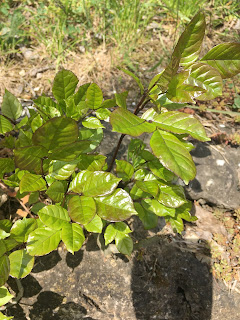I am almost equally fond of this sheltered stone bench, which is just beyond the pale blue school. It is seems to me to have been built with the kind of care and attention to urban amenities that one no longer even expects, let alone receives, today:
Spring in Europe, even in the most architecturally blighted landscape, always lightens the heart via trees and birds and flowers (we all of us have our own inner Fotherington Thomas, don't we?) There is the sudden return of birdsong. There is the new growth, the leaves so fresh and, at the risk of sheer banality, so green and so glossy.
Anyway, I got so carried away in my pleasure at the arrival of spring that, as I was coming back down the hill, I embarked on an exchange with a man who was sitting on a bench. Around the man not only was their birdsong and new leaf on all the trees and bushes, but also flowering poppies, wintersweet, lilac and honeysuckle. There was a very slight breeze but it resulted in a rippling, dappled pattern of shadows that was very pleasing.
If there were a Desert Island Discs for trees and I could only take one from my list of favourites, a horse chestnut tree in spring time would without a shadow of a doubt be the tree that I would choose for my desert island (speaking of Desert Island Discs, apparently there was a genius on the other day who chose as his luxury a Viennese cafe).
The building this horse chestnut stands beside was during the second world war, in case anyone is interested, the Swedish embassy, and it housed Raoul Wallenberg
The man was not looking particularly cheerful, and I thought he might be feeling lonely. Therefore, in a spirit of friendliness, I commented as I passed that it was a beautiful day. He looked at me with a face that did not seem to be lit up with the same delight as mine. "It could be warmer", he said.
I was reminded of the story told regularly by the headmistress at a school I went to for a couple of years. I think it was a parable from Aristotle, or could it have been Plato? Anyway it involves a sage man, walking along the road that led from Athens to Sparta. He sees a man coming towards him and when that man gets close, he hails the sage man and asks him if he is coming from Athens. When the sage man replies that he is, the wayfarer asks what Athens is like. The sage man replies with another question (does this suggest it is a story of Plato's, was counter questioning his method?): "What did you think of Sparta?"
"I hated it", the wayfarer tells the sage man. "Well then, you will hate Athens", says the sage man. The two of them part and each continues on his way.
Soon the sage man sees another figure coming towards him. The self-same conversation follows, except that when the second wayfarer asks about what Athens is like and is asked in turn how he liked Sparta, he responds by saying he loved it. The sage man then assures him that in that case he will love Athens too.
That man on the bench, I thought, didn't see a beautiful day; he only saw a day that could be better - he would have hated Sparta and therefore he would have hated Athens.
But then, when I told a friend of mine the story, she explained that, while the word for "day" that I used in Hungarian is indeed the word for "day", the man probably misunderstood me because it is also the word for "sun"; he probably thought I was commenting specifically on the sun and its warmth at that moment, and I ought to have used the word for weather. Which proves that drawing any conclusions from interchanges in foreign languages is fraught with complication.






No comments:
Post a Comment